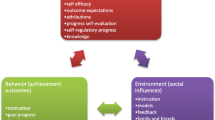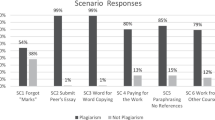Abstract
Plagiarism is a serious problem in an academic environment because it breaches academic honesty and integrity, copyright law, and publication ethics. This paper aims at revealing English as a Foreign Language (EFL) lecturers’ responses in dealing with some factors affecting students’ plagiarism practice in Indonesian Higher Education context. This study employed a qualitative method with case study approach. Eight experienced EFL lecturers were conveniently recruited, and the data were analyzed using thematic analysis technique. The results revealed that EFL students perpetrated plagiarisms due to three factors; 1) convenient access to online resources allowed the EFL students to retrieve some information without properly citing the sources, 2) Questionable lecturers’ assessment, and 3) Student has poor academic writing-skills. The plagiarism practices are apparent in the Indonesian educational context, and this may produce other negative consequences, such as academic dishonesty and poor academic writing. However, further investigation is necessary to examine the relative contribution of each factor on students’ plagiarism practice.
Similar content being viewed by others
References
Adiningrum, T. S. (2011). How different are we ? Understanding and managing plagiarism between East and West. Journal of Academic Language & Learning, 5(2), 88–98.
Akbulut, Y., Şendağ, S., Birinci, G., Kılıçer, K., Şahin, M. C., & Odabaşı, H. F. (2008). Exploring the types and reasons of Internet-triggered academic dishonesty among Turkish undergraduate students: Development of Internet-Triggered Academic Dishonesty Scale (ITADS). Computers & Education, 51(1), 463–473.
Arnold, M. J. (1995). “Lack of Basic Writing Skills and Its Impact on the Legal Profession, The”, Cap. UL Rev., HeinOnline, Vol. 24, p. 227.
Arslan, R. S., & Üçok-Atasoy, M. (2020). An investigation into EFL teachers’ assessment of young learners of English: Does practice match the policy? International Journal of Learning and Teaching, 7(2), 468–484.
Austin, M. J., & Brown, L. D. (1999). Internet Plagiarism: Developing Strategies to Curb Student Academic Dishonesty. The Internet and Higher Education, 2(1), 21–33.
Babaii, E., & Nejadghanbar, H. (2016). Plagiarism Among Iranian Graduate Students of Language Studies: Perspectives and Causes. Ethics & Behavior, 8422, 1–19.
Bashori, M. (2018). I love Indonesia: Perceptions of Web-facilitated language learning among learners of English as a Foreign Language. JALT CALL Journal, 14(2), 157–189.
Becker, A. (2016). “Student-generated scoring rubrics: Examining their formative value for improving ESL students’ writing performance”. Assessing Writing. Elsevier Inc. Vol. 29 pp. 15–24.
Bennett, R. (2005). Factors associated with student plagiarism in a post-1992 university. Assessment & Evaluation in Higher Education, 30(2), 137–162.
Beyth-Marom, R., Chajut, E., Roccas, S., Sagiv, L. (2003). Internet-assisted versus traditional distance learning environments: factors affecting students’ preferences. Computers & Education, 41(1), 65–76.
Braun, V., & Clarke, V. (2006). “Using thematic analysis in psychology.” Qualitative Research in Psychology, 3, 77–101.
Brown, J. D., & Bailey, K. M. (1984). A Categorial Instrument for Scoring Second and Language Writing Skills. Language Learning, Blackwell Publishing Ltd, 34(4), 21–38.
Cahyono, B. Y. (2005). “How Australian and Indonesian Universities Treat Plagiarism: A Comparative Study”. Jurnal Ilmu Pendidikan, Vol. 12 No. 3.
Can, G., & Walker, A. (2011). “A Model for Doctoral Students’ Perceptions and Attitudes Toward Written Feedback for Academic Writing”. Research in Higher Education, Utah State University, United States-Utah, Vol. 52 No. 5, pp. 508–536.
Cirocki, A., & Farrell, T. S. C. (2019). Professional development of secondary school EFL teachers: Voices from Indonesia. System, Elsevier Ltd, 85, 102111.
Clayton, J. (2007). “The validation of the online learning environment survey”. Proceedings Ascilite Singapore 2007 Full Paper: Clayton. pp. 159–167.
Coughlin, P. E. (2015). “Plagiarism in five universities in Mozambique: Magnitude, detection techniques, and control measures”. International Journal for Educational Integrity, 11(1), 2.
Cumming, A. (2001). ESL/EFL instructor's practices for writing assessment: specific purposes or general purposes?. Language Testing 18 2 207-224
DIKTI. (2012). “Publikasi Karya Ilmiah”. Jakarta.
Dwi, I. G. N. A. R., Santosa, M. H., & Paramartha, A. A. G. Y. (2020). A Study of Indonesian lecturers'perception on student plagiarism. SAGA: Journal of English Language Teaching and Applied Linguistics 1(2), 81–94.
Eriksson, L., & McGee, T. R. (2015). “Academic dishonesty amongst Australian criminal justice and policing university students: individual and contextual factors.” International Journal for Educational Integrity, 11(1), 5.
Espinoza, L. A., & Nájera, J. M. (2015). How to correct teaching methods that favour plagiarism: recommendations from teachers and students in a Spanish language distance education university. Assessment and Evaluation in Higher Education, 40(8), 1070–1078.
Fenster, J. (2016). Teaching Note—Evaluation of an Avoiding Plagiarism Workshop for Social Work Students. Journal of Social Work Education, Taylor & Francis, 52(2), 242–248.
Gottardello, D., del Mar Pàmies, M., Valverde, M. (2017). Professors’ perceptions of university students’ plagiarism: A literature review.
Guest, G., MacQueen, K. M., Namey, E. E. (2011). Applied Thematic Analysis, Sage.
Guraya, S. Y., & Guraya, S. S. (2017). The confounding factors leading to plagiarism in academic writing and some suggested remedies: A systematic review. Systematic Review, 67(5), 767–773.
Hamuddin, B. & Dahler. (2018). “Blogs as Powerful Learning Tools: The Perception from EFL Students in Riau Main Island Indonesia”. IOP Conference Series: Earth and Environmental Science Vol. 156 No. 1. available at: https://doi.org/10.1088/1755-1315/156/1/012060.
Hanna, K. J. (2009). Student Perceptions of Teacher Comments: Relationships between Specific Aspects of Teacher Comments and Writing Apprehension, ProQuest Dissertations and Theses. The University of North Dakota, United States -- North Dakota.
Hu, G., & Lei, J., (2015). Chinese University Students’ Perceptions of Plagiarism. Ethics & Behavior, 25(3), 233–255.
Jackson, P. A. (2006). Plagiarism Instruction Online: Assessing Undergraduate Students’ Ability to Avoid Plagiarism. College Research Libraries, Association of College & Research Libraries, 67(5), 418–428.
Jereb, E., Perc, M., Lämmlein, B., Jerebic, J., Urh, M., Podbregar, I., & Šprajc, P. (2018). Factors influencing plagiarism in higher education: A comparison of German and slovene students. PLoS ONE, 13(8), 1–17.
Kothari, C. R. (2004). Research Methodology: Methods and Techniques. New Age International (P) Ltd.
Kutieleh, S., & Adiningrum, T. S. (2011). How different are we? Understanding and managing plagiarism between East and West. Journal of Academic Language and Learning, 5(2), A88–A98.
Lam, R. (2013). “Two portfolio systems: EFL students’ perceptions of writing ability, text improvement, and feedback”. Assessing Writing, Elsevier Inc. Vol. 18 No. 2, pp. 132–153.
Lee, D. E. (2009). Cheating in the Classroom: Beyond Policing. Clearing House: A Journal of Educational Strategies, Issues and Ideas, 82(4), 171–176.
Lei, J., & Hu, G. (2014). Chinese ESOL lecturers’ stance on plagiarism: Does knowledge matter? ELT Journal, 68(1), 41–51.
Leki, I., & Carson, J. G. (1994a). Students’ Perceptions of EAP Writing Instruction and Writing Needs across the Disciplines. TESOL Quarterly, 28(1), 81.
Leki, I., & Carson, J. G. (1994b). Students’ perceptions of EAP writing instruction and writing needs across the disciplines. Tesol Quarterly, Wiley Online Library, 28(1), 81–101.
Leo, S. (2010). Preventing Plagiarism around Our Campus in Indonesia. Bandung: TEFLIN.
Lin, C.-H.S., & Wen, L.-Y.M. (2006). Academic dishonesty in higher education—a nationwide study in Taiwan. Higher Education, 54(1), 85–97.
Manalu, M. H. (2013). Students’ perception on plagiarism. Passage, 1(2), 71–80.
McKimm, J., Jollie, C., & Cantillon, P. (2003). ABC of learning and teaching: Web based learning. BMJ (Clinical Research Ed.), 326(7394), 870–873.
Montgomery, J. L., & Baker, W. (2007). Teacher-written feedback: Student perceptions, teacher self-assessment, and actual teacher performance. Journal of Second Language Writing, 16(2), 82–99.
Moos, R. H. (1980). Evaluating classroom learning environments. Studies in Educational Evaluation, 6(3), 239–252.
Mukminin, A., Rohayati, T., Putra, H. A., Habibi, A., & Aina, M. (2017). The long walk to quality teacher education in Indonesia: EFL student teachers’ motives to become a teacher and policy implications. Elementary Education Online, 16(1), 35–59.
Nurweni, A., & Read, J. (1999). The English vocabulary knowledge of Indonesian university students. English for Specific Purposes, Elsevier, 18(2), 161–175.
Octaberlina, L. R. (2009). “Plagiarism In English Language Theses In Indonesia”. Jurnal Ilmu Pendidikan Vol. 14 No. 3.
Ramzan, M., Munir, M. A., Siddique, N. and Asif, M. (2011). “Awareness about plagiarism amongst university students in Pakistan”. Higher Education, available at: https://doi.org/10.1007/s10734-011-9481-4.
Roig, M. (1999). When College Students’ Attempts at Paraphrasing Become Instances of Potential Plagiarism. Psychological Reports, Ammons Scientific, 84(3), 973–982.
Rovai, A. P. (2000). Online and traditional assessments: what is the difference? The Internet and Higher Education, 3(3), 141–151.
Sadler, D. R. (2005). Interpretations of criteria-based assessment and grading in higher education. Assessment & Evaluation in Higher Education, 30(2), 175–194.
Setiyadi, A. B., & Mahpul and Wicaksono, B.A. (2019). Exploring motivational orientations of English as foreign language (EFL) learners: A case study in Indonesia. South African Journal of Education, 39(1), 1–13.
Smith, M., Ghazali, N., & Minhad, S. F. N. (2007). Attitudes towards plagiarism among undergraduate accounting students: Malaysian evidence. Asian Review of Accounting, 15(2), 122–146.
Sommers, N. (2006). Across the drafts. College Composition and Communication, National Council of Teachers of English, 58(2), 248–257.
The late Henry A. Murray. (2007). Explorations in Personality. Oxford University Press.
van Dijk, A. M., & Lazonder, A. W. (2016). Scaffolding students’ use of learner-generated content in a technology-enhanced inquiry learning environment. Interactive Learning Environments, 24(1), 194–204.
Yugianingrum. (2008). Citations and Citing Behaviors in EFL Undergraduate Theses. Educationist, II(2), 74–85.
Acknowledgements
Universitas Negeri Makassar funded this research with contract number: SP DIPA–042.01:2.400964/2019, December 5, 2018. The funding is under Rector of Universitas Negeri Makassar’s Decision Letter, number: 3576/UN36/KP/2019, March 29, 2019.
Author information
Authors and Affiliations
Corresponding author
Additional information
Publisher’s note
Springer Nature remains neutral with regard to jurisdictional claims in published maps and institutional affiliations.
Rights and permissions
About this article
Cite this article
Patak, A.A., Wirawan, H., Abduh, A. et al. Teaching English as a Foreign Language in Indonesia: University Lecturers’ Views on Plagiarism. J Acad Ethics 19, 571–587 (2021). https://doi.org/10.1007/s10805-020-09385-y
Accepted:
Published:
Issue Date:
DOI: https://doi.org/10.1007/s10805-020-09385-y




